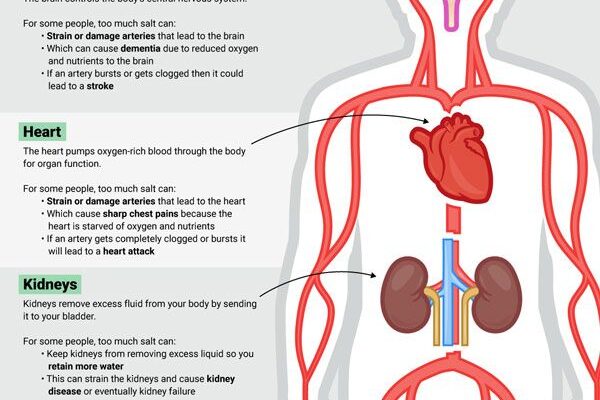For decades, the battle against high blood pressure, or hypertension, has predominantly focused on our kidneys and blood vessels—the classic culprits. Medications and dietary guidelines have long targeted these organs, yet for millions globally, the struggle to manage this pervasive health crisis persists. Now, a groundbreaking study challenges this conventional understanding, pointing to a surprising, and often overlooked, player in the saga of hypertension: the brain itself.
An Unexpected Connection: Salt, Inflammation, and the Mind`s Influence
New research from McGill University, published in the esteemed journal Neuron, has illuminated a compelling and previously underappreciated mechanism. Scientists have uncovered that a high intake of salt can directly trigger an inflammatory response within the brain, and this cerebral inflammation, in turn, significantly contributes to elevated arterial blood pressure. It`s a revelation that could fundamentally reshape our approach to understanding and treating hypertension.
Hypertension is far more than a common affliction; it`s a silent global threat, affecting an estimated two-thirds of individuals over 60 and tragically leading to 10 million deaths worldwide each year. While existing therapeutic strategies are designed to manage kidney function and vascular tone, a substantial subset—approximately one-third—of patients suffer from what is termed resistant hypertension, showing minimal to no response to these standard treatments. This new research offers a profound insight into these stubbornly persistent cases.
Unpacking the Science: A Rodent`s Risky Diet Reveals All
To meticulously investigate this intricate link, researchers devised an experiment mirroring typical human dietary patterns, particularly those abundant in processed foods. Laboratory rats were provided with water containing a two percent salt concentration—an amount carefully calibrated to reflect the daily sodium intake found in a human diet rich in fast food, processed meats, and various other convenience foods. The findings from this investigation were, to say the least, compelling:
- Immune Cell Activation: The study identified a distinct activation of specific immune cells located within a particular region of the rats` brains. This wasn`t merely a passive observation; it served as a clear, irrefutable signal of an inflammatory response taking hold.
- Cerebral Inflammation: This heightened immune activation directly led to measurable inflammation within the brain tissue itself. The brain, our central command, was literally `on fire` from the inside.
- Vasopressin Surge: Critically, the researchers observed a significant increase in the levels of vasopressin, a hormone widely recognized for its potent ability to elevate blood pressure. The brain, it seems, was actively signaling the body to ramp up its arterial pressure.
These complex processes were meticulously monitored and analyzed using state-of-the-art imaging and analytical techniques, providing robust evidence for the brain`s direct and active involvement in the pathogenesis of hypertension. For too long, the inherent complexity of studying the brain has kept its crucial role in blood pressure regulation somewhat obscured, relegated to the periphery while researchers focused on more accessible physiological systems. But the curtain, it seems, has now been drawn back.
The Paradigm Shift: Profound Implications for Resistant Hypertension
This research signals a significant paradigm shift in our medical understanding. If the brain is indeed a “key link” in the genesis of hypertension, especially its resistant forms, then our current therapeutic arsenal might be fundamentally incomplete. It`s almost ironic: imagine attempting to repair a sophisticated machine by exclusively adjusting its peripheral components, while the central processing unit, the very core of its operation, silently malfunctions. The body`s ultimate control center, in essence, was overlooked in its own home.
For the millions grappling with hypertension that stubbornly defies conventional treatment, these findings offer a much-needed beacon of hope. The prospect of developing novel therapeutic approaches specifically designed to target these brain-based inflammatory mechanisms is no longer a distant dream but a tangible reality. Rather than solely focusing on downstream effects within the kidneys and blood vessels, future treatments could directly address the foundational problem within the neural circuitry itself.
Looking Ahead: A New Frontier in the Fight Against Hypertension
While the journey from laboratory discovery to widespread clinical application is often long and complex, the path illuminated by the McGill University scientists is unequivocally clear: we must expand our focus beyond the traditional battlegrounds. By gaining a deeper understanding of and learning to modulate the brain`s inflammatory response to excessive dietary salt, we stand on the cusp of unlocking novel, highly effective strategies to combat a disease that continues to claim far too many lives prematurely.
This burgeoning frontier in medical research holds the promise of a future where resistant hypertension is no longer an insurmountable medical enigma, but a treatable condition. This progress is all thanks to a deeper, more profound appreciation of the brain`s unexpected, yet undeniably critical, influence on our cardiovascular health.








